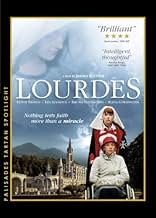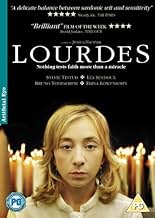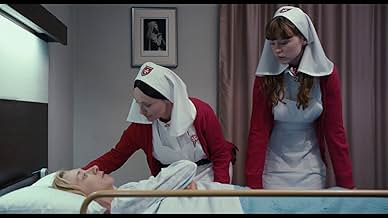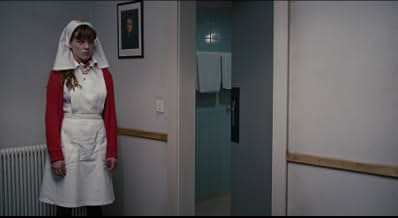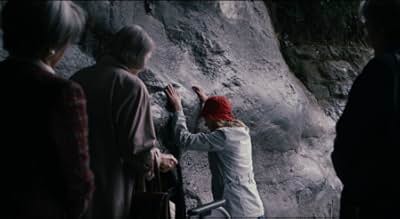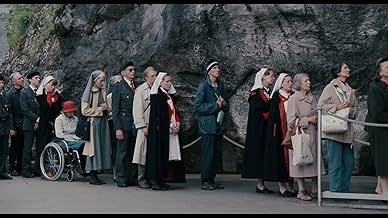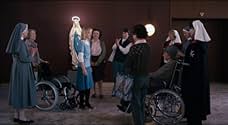AVALIAÇÃO DA IMDb
6,9/10
3,9 mil
SUA AVALIAÇÃO
Adicionar um enredo no seu idiomaIn order to escape her isolation, wheelchair-bound Christine makes a life changing journey to Lourdes, the iconic site of pilgrimage in the Pyrenees Mountains.In order to escape her isolation, wheelchair-bound Christine makes a life changing journey to Lourdes, the iconic site of pilgrimage in the Pyrenees Mountains.In order to escape her isolation, wheelchair-bound Christine makes a life changing journey to Lourdes, the iconic site of pilgrimage in the Pyrenees Mountains.
- Prêmios
- 12 vitórias e 7 indicações no total
Orsolya Tóth
- Child in Wheelchair
- (as Orsi Tóth)
Gerith Holzinger
- Malteserin
- (as Gerith Alice Holzinger)
Avaliações em destaque
A girl with MS can't move her body, except for the face muscles. She goes to Lourdes, the place of miracles. She's not just tired of her life, she's of course also envious about life of others.
Usually, it's obvious there on the screen you shall look. Not here. Long takes, many extras, everybody make their moves and everybody is interesting, although you may forget them for a while, watching others.
Quietly, so many believable emotions are to be found here. Jealousy, slight passion, hopes, disappointments. And after a while you're not watching, you're among these pilgrims, and although you've never been in this environment, you recognize everything. And Sylvie Testud is superb.
Usually, it's obvious there on the screen you shall look. Not here. Long takes, many extras, everybody make their moves and everybody is interesting, although you may forget them for a while, watching others.
Quietly, so many believable emotions are to be found here. Jealousy, slight passion, hopes, disappointments. And after a while you're not watching, you're among these pilgrims, and although you've never been in this environment, you recognize everything. And Sylvie Testud is superb.
Summary
Lourdes is a remarkable psychological and social x-ray of the world around the famous religious complex in the Pyrenees, with that clinical precision so typical of Austrian cinema and with a delicate balance in which hints of irony always give way to respect and piety. The film achieves moments of an absolutely human, moving religiosity, such as I have rarely seen in a film.
Review:
Jessica Hausner's film follows Christine, a motor disabled person, during her journey through the famous tourist-religious complex around the Lourdes Grotto in the French Pyrenees.
Multiple dimensions and themes run through this film. On the one hand, there is a look at the disease, the relationship between the healthy and the sick and how she considers the Catholic religion to the sick and the concept of healing, put into the mouths of their own priests.
On the other hand, Lourdes paints a picture of that touristic-religious universe viewed with that clinical precision so typical of Austrian cinema, with a delicate balance in which hints of irony always give way to respect and piety. It is difficult at first to place oneself in that world of patients, companions, relatives, nuns, priests and volunteers of the Order of Malta (where each one fulfills a precise, transitory or permanent function), where a sociogram is drawn where solidarity intersects , misgivings, hope, desire, jealousy, envy, frustration and, of course, faith, in a setting that is enriched with real shots of masses and mass movements in which the film leans into the documentary . They all follow a kind of procession (with something of a way of the cross) scheduled and methodical, waiting for the miracle of healing to take place.
Why do the sick go to Lourdes? Christine answers that question early in the film, and not exactly from a pious place. Sylvie Testud remarkably puts the body to her character and her evolution, accompanied by Maria (Lea Seydoux, in a rather small role), the companion who embodies health.
As we had already seen in the also notable Little Joe, Hausner beautifully frames her scenes preferably in fixed and geometric planes. Supported by a wonderful use of Bach's music, Lourdes achieves moments of an absolutely human, moving religiosity, such as I have rarely seen in a film.
Lourdes is a remarkable psychological and social x-ray of the world around the famous religious complex in the Pyrenees, with that clinical precision so typical of Austrian cinema and with a delicate balance in which hints of irony always give way to respect and piety. The film achieves moments of an absolutely human, moving religiosity, such as I have rarely seen in a film.
Review:
Jessica Hausner's film follows Christine, a motor disabled person, during her journey through the famous tourist-religious complex around the Lourdes Grotto in the French Pyrenees.
Multiple dimensions and themes run through this film. On the one hand, there is a look at the disease, the relationship between the healthy and the sick and how she considers the Catholic religion to the sick and the concept of healing, put into the mouths of their own priests.
On the other hand, Lourdes paints a picture of that touristic-religious universe viewed with that clinical precision so typical of Austrian cinema, with a delicate balance in which hints of irony always give way to respect and piety. It is difficult at first to place oneself in that world of patients, companions, relatives, nuns, priests and volunteers of the Order of Malta (where each one fulfills a precise, transitory or permanent function), where a sociogram is drawn where solidarity intersects , misgivings, hope, desire, jealousy, envy, frustration and, of course, faith, in a setting that is enriched with real shots of masses and mass movements in which the film leans into the documentary . They all follow a kind of procession (with something of a way of the cross) scheduled and methodical, waiting for the miracle of healing to take place.
Why do the sick go to Lourdes? Christine answers that question early in the film, and not exactly from a pious place. Sylvie Testud remarkably puts the body to her character and her evolution, accompanied by Maria (Lea Seydoux, in a rather small role), the companion who embodies health.
As we had already seen in the also notable Little Joe, Hausner beautifully frames her scenes preferably in fixed and geometric planes. Supported by a wonderful use of Bach's music, Lourdes achieves moments of an absolutely human, moving religiosity, such as I have rarely seen in a film.
The photography and mise-en-scene are great but the characters lack depth (Testud's room mate for example), the acting is great considering what the skinny script offers them (Testud and Seydoux are remarkables) but lots of subplots are left unexploited
I didn't think the film was that rewarding, it drags a bit towards the end, and the film feels a bit pointless sometimes
The film doesn't know if it should be Christian, critical or ironic, the best parts are when the it's unjudgemenal and contemplative
In the end I don't think Catholics or Agnostics would really like that film very much, it's got a strong sense of aesthetics but lacks personality and determination
I didn't think the film was that rewarding, it drags a bit towards the end, and the film feels a bit pointless sometimes
The film doesn't know if it should be Christian, critical or ironic, the best parts are when the it's unjudgemenal and contemplative
In the end I don't think Catholics or Agnostics would really like that film very much, it's got a strong sense of aesthetics but lacks personality and determination
Forgive my ignorance of neither Lourdes or theology, without a Catholic background, to me the miracles sound hyperbolic and outlandish at first, but after watching the film, even though being an agnostic, some kind of insight surfaced upon my mind's eye that the miracle itself could be a fatal burden to whom it is granted, which is my very direct response, which I am not sure would be the prime aim of the director, for me, it does pique my curiosity definitely.
Due to the fact that the mystery has still been in a moot beyond any explanation by now, the third feature from Austrian director Jessica Hausner (whose previous film is a haunting ghost story - HOTEL 2004) cannily digresses the mythological topic of the epiphanic moment, instead, the film focuses directly on the individuals of the pilgrim group (thought from a restrained distance), the most noteworthy comes from their blunt reactions before/after the miraculous event, which unavoidably compass piety, expectation, sympathy versus selfishness, jealousy, gloating, envy and bitterness. As a matter of fact it is more like a discreet dissertation on a test of humanity, which literally and cruelly reveals the inconvenient truth that it is our soul needs to be cured.
What I truly commend here is the laconic shots, the full-blown palette and a calm stance which is pervasive throughout the entire movie,
all of which establish a sincere austerity and mercy to its views, plus the non-intrusion composition drastically enhances the solemnity and sacrality of its proposition
The female protagonist Sylvie Testud's performance is extraordinarily astute, despite of her word-deficient and gesture-limited role while the supporting group is also tellingly awesome, terse but impressive!
Due to the fact that the mystery has still been in a moot beyond any explanation by now, the third feature from Austrian director Jessica Hausner (whose previous film is a haunting ghost story - HOTEL 2004) cannily digresses the mythological topic of the epiphanic moment, instead, the film focuses directly on the individuals of the pilgrim group (thought from a restrained distance), the most noteworthy comes from their blunt reactions before/after the miraculous event, which unavoidably compass piety, expectation, sympathy versus selfishness, jealousy, gloating, envy and bitterness. As a matter of fact it is more like a discreet dissertation on a test of humanity, which literally and cruelly reveals the inconvenient truth that it is our soul needs to be cured.
What I truly commend here is the laconic shots, the full-blown palette and a calm stance which is pervasive throughout the entire movie,
all of which establish a sincere austerity and mercy to its views, plus the non-intrusion composition drastically enhances the solemnity and sacrality of its proposition
The female protagonist Sylvie Testud's performance is extraordinarily astute, despite of her word-deficient and gesture-limited role while the supporting group is also tellingly awesome, terse but impressive!
Lourdes is a famous Catholic shrine in France, visited by pilgrims from around the world seeking miraculous cures for serious medical conditions.
Christine(Sylvie Testud) is wheelchair bound due to multiple sclerosis. Although not deeply religious, she decides to try to be healed by divine intervention. After a few days, she slowly is able to get up and walk. Other visitors with much more faith than Christine have philosophical debates on the fairness of it all.
She meets a man while apparently making progress physically, but the budding romance fizzles quickly when the guy proves to be unable to accept her limitations.
A night view of the city with only the faithful holding up candles while Ave Maria plays in the background is simply breathtaking. I am not personally religious, but I grew up Catholic and can appreciate the beauty of the symbolism and message. Jessica Hausner does not preach to the audience at any point, but gives us the opportunity to make up our own minds about faith and belief in miracles. Lourdes is an interesting conversation starter and a good movie.
Christine(Sylvie Testud) is wheelchair bound due to multiple sclerosis. Although not deeply religious, she decides to try to be healed by divine intervention. After a few days, she slowly is able to get up and walk. Other visitors with much more faith than Christine have philosophical debates on the fairness of it all.
She meets a man while apparently making progress physically, but the budding romance fizzles quickly when the guy proves to be unable to accept her limitations.
A night view of the city with only the faithful holding up candles while Ave Maria plays in the background is simply breathtaking. I am not personally religious, but I grew up Catholic and can appreciate the beauty of the symbolism and message. Jessica Hausner does not preach to the audience at any point, but gives us the opportunity to make up our own minds about faith and belief in miracles. Lourdes is an interesting conversation starter and a good movie.
Você sabia?
- CuriosidadesWhen the script for Lourdes (2009) first landed on Sylvie Testud's desk, her initial reaction was that she didn't want to do anything that might involve her playing a nun or taking easy potshots at religion. She instantly changed her mind after reading the script.
- ConexõesFeatured in Women Make Film: A New Road Movie Through Cinema (2018)
Principais escolhas
Faça login para avaliar e ver a lista de recomendações personalizadas
- How long is Lourdes?Fornecido pela Alexa
Detalhes
- Data de lançamento
- Países de origem
- Centrais de atendimento oficiais
- Idioma
- Também conhecido como
- 奇蹟度假村
- Locações de filme
- Empresas de produção
- Consulte mais créditos da empresa na IMDbPro
Bilheteria
- Orçamento
- € 2.000.000 (estimativa)
- Faturamento bruto mundial
- US$ 2.947.270
- Tempo de duração
- 1 h 36 min(96 min)
- Cor
- Mixagem de som
- Proporção
- 1.85 : 1
Contribua para esta página
Sugerir uma alteração ou adicionar conteúdo ausente


